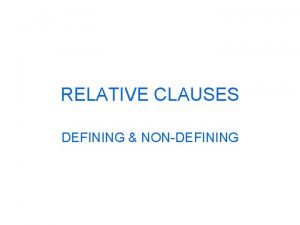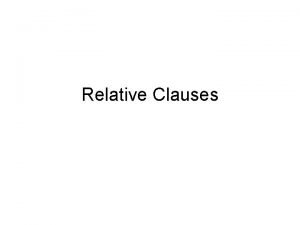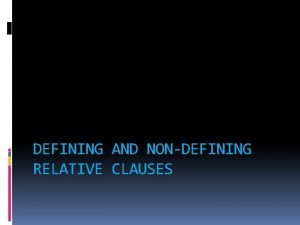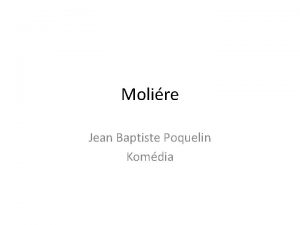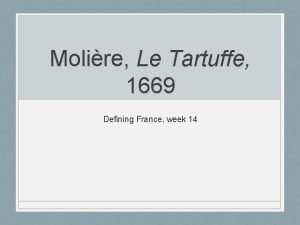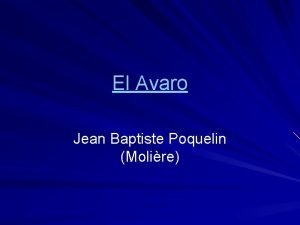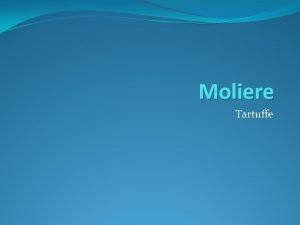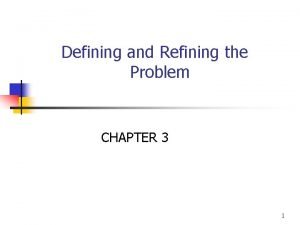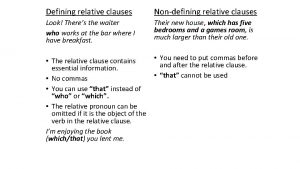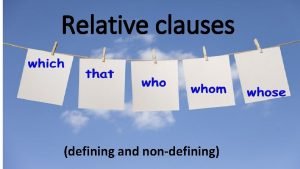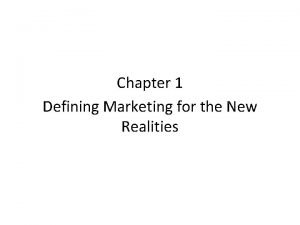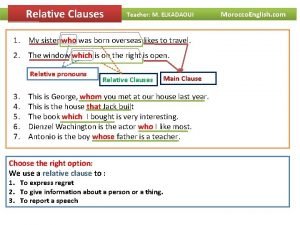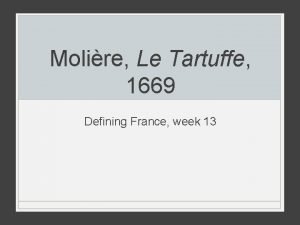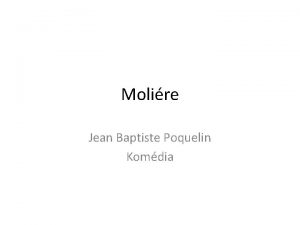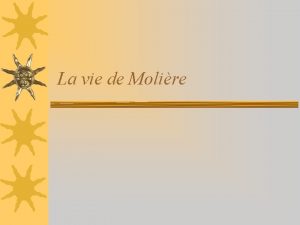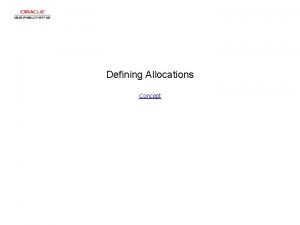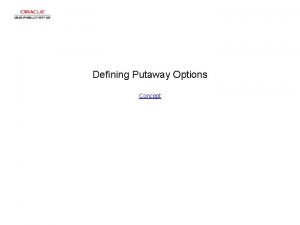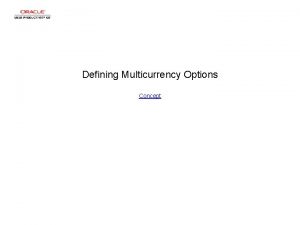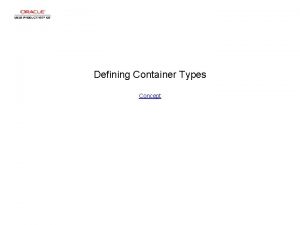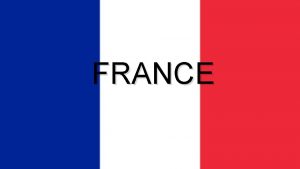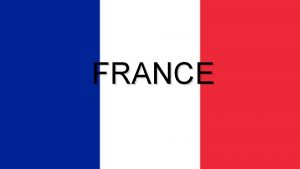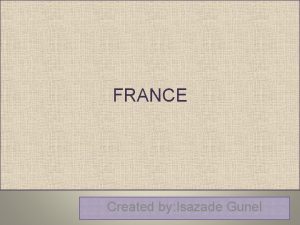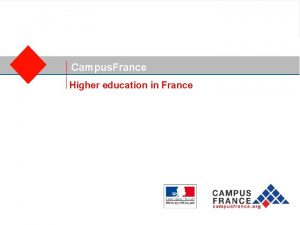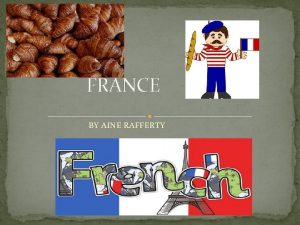Molire Le Tartuffe 1669 Defining France week 14

























- Slides: 25

Molière, Le Tartuffe, 1669 Defining France, week 14

Tartuffe • Name = hypocrisy • ‘type character’ – the ‘dévot’, the ‘faux dévot’ • Not a priest so he can marry

Orgon • Bourgeois • Desire to believe • Insecure • Long history of being religious, a good Christian like many in the audience

Cléante and Elmire • Cléante: • Voice of reason • ‘Sans cesse vous prêchez des maximes de vivre’ I, 1 • Not comic • Elmire: • Orgon’s 2 nd wife • Serious character • Object of Tartuffe’s desire

The Younger Generation • Damis: • Exiled • Importance of family honour • Mariane: • ‘inefficace? ’ • Threat of her marriage • Valère • Mariane’s lover

Other characters • Dorine: • Voice of reason along with Cléante • ‘suivante’ • Subversive but acts in the family interest • From outside the household: • Monsieur Loyal • L’Exempt

Major Themes • Religion • Hypocrisy • Household • Masks • Theatricality

Religion • ‘To enjoy Tartuffe it is important to know that to Molière’s contemporaries every aspect of religion was an absorbing topic, but that one did not write about it in a comedy. ’ • Gaston Hall, Molière: Tartuffe (Southampton: The Camelot Press, 1977), p. 7 • French Wars of Religion, 1562 -1598 • Dragonnades • Revocation of the Edict of Nantes, 1685

Religion • Jesuits and Jansenists • Compagnie du Saint-Sacrement • • • Survey of nation’s morals ‘directeurs de conscience’ Richelieu and Mazarin Banned 1660 Role in Tartuffe’s censorship in 1664? Charpy de Sainte-Croix and Bendinelli

Religion • How to practice religion: • Religion is serious • Hair shirt, his scrounge, the whip • ‘Que vous alliez vêtue ainsi qu’une princesse’, I, 1 • Actors excommunicated • Pascal – hair shirt and belt with inward iron spikes

Religion and Hypocrisy • ‘Voulez-vous qu’il y coure à vos heures précises, | Comme ceux qui n’y vont que pour être apercus? ’ II, 2 • Religion vs. façade of religion • Use of religious language – gallant, poetic and religious language for seduction, III, 3 • Hypocrisy a mortal sin

Satire • ‘Gros et gras, le teint frais, et la bouche vermeille. ’ I, 4 • Hyperbole and satire • Tradition continued today

Household • Orgon 358 lines, Dorine 339 • Father as head of household • ‘Faites que votre fils se taise ou se retire’, V, 4 • Jacques Guicharnaud ‘Orgon’s entourage reacts to him rather like subjects would toward a king [devoted]… to a bad minister. ’ • Cited in Gaston Hall, Comedy in Context: Essays on Molière (Jackson: University Press of Mississippi, 1984), p. 145

Masks and Theatricality • Elmire’s second encounter with Tartuffe • ‘En mettant le théâtre sur le théâtre, Molière peut, par un procédé d’ironie dramatique, démontrer le mécanisme même de l’illusion : l’apparence se révèle comme le seul moyen de montrer la vérité. C’est toute la force du théâtre qui, se donnant pour illusoire, ne ment pas et dit le vrai. ’ • Jean Serroy, ‘Préface’, in Molière, Le Tartuffe (Paris: Gallimard, 2014), pp. 730 (pp. 24 -5).

Masks and Theatricality • Hypocrite to impostor • L’Exempt • Deus ex machina/Rex ex machina

Molière and ‘Classicism’ • Central tenets: unities, alexandrine, acts and scenes, vraisemblance, biensénace • Alexandrine: • Verse to imitate real life • 5 acts to ennoble the play? • Hint of tragic?

Molière and ‘Classicism’ • Unity of place: • household • Unity of time: • ‘trois heures’, mentions of time throughout the play • Unity of action: • around the character Tartuffe

Molière and ‘Classicism’ • Vraisemblance • Then vs. now – careful in our perceptions • Bienséance • Declaration, 16 April 1641, forbade ‘actions malhonnêtes’, ‘paroles lascives ou à double entente qui puissant blesser l’honnêteté publique’. • Tartuffe’s seduction of Elmire as shocking • Obedience to the rules vs. their expansion

Comedy • The comedy of gesture • The comedy of the language • The comedy of characters • The comedy of the situation • The comedy of manners or ‘la comédie de mœurs’

Comedy of Gesture • ‘(Mariane se recule avec surprise)’ II, 1 • ‘il fait mime de grande résistance’ II, 4 • ‘(Elle recule sa chaise, et Tartuffe rapproche la sienne)’ III, 3

Comedy of Gesture • Damis in the cupboard III, 4 • Orgon under the table as Tartuffe attempts to seduce Elmire, IV, 5

Comedy of Language • Language: what it says vs. what it means, III, 4 • Henri Bergson, Le Rire. Essai sur la signification du comique (1900) • Repetition: ‘Et Tartuffe? ’, ‘Le pauvre homme!’ I, 4

Comedy of Character • Conflict: • Orgon vs. Dorine • Orgon vs. Cléante • Tartuffe: those for and against him • Exaggeration: • Orgon’s readiness to believe • Reflexion on our own weaknesses

Comedy of Situation • Reversal of situations • Mikhail Bakhtin, Rabelais and His World (1941) • ‘Carnevalesque’

Comedy of Manners • Comédie de mœurs • Characteristic traits of social class, stock characters • Satire: parody, burlesque, exaggeration, irony • ‘Comédie’ vs. comedy
 Mount etna 1669 eruption facts
Mount etna 1669 eruption facts Nondefining
Nondefining Defining non defining farkı
Defining non defining farkı Relative clauses defining and non defining
Relative clauses defining and non defining Essential adjective clause
Essential adjective clause Oraciones defining y non defining
Oraciones defining y non defining Defining and non defining relative clauses in telugu
Defining and non defining relative clauses in telugu Molire
Molire Gros et gras le teint frais et la bouche vermeille
Gros et gras le teint frais et la bouche vermeille Jean baptiste poquelin
Jean baptiste poquelin Tartuffe
Tartuffe Tartuffe szerkezete
Tartuffe szerkezete Introduction tartuffe
Introduction tartuffe Week by week plans for documenting children's development
Week by week plans for documenting children's development Broad problem area examples
Broad problem area examples Defining moments
Defining moments Non defining relatives clauses
Non defining relatives clauses Defining globalization
Defining globalization Non-defining relative clauses as sentence modifiers
Non-defining relative clauses as sentence modifiers What is this image
What is this image Defining and debating america's founding ideals
Defining and debating america's founding ideals Kinematics defining motion answer key
Kinematics defining motion answer key Why was vimy ridge, a defining moment for canada
Why was vimy ridge, a defining moment for canada New market realities
New market realities Defining relative clause worksheet
Defining relative clause worksheet Defining leadership
Defining leadership

